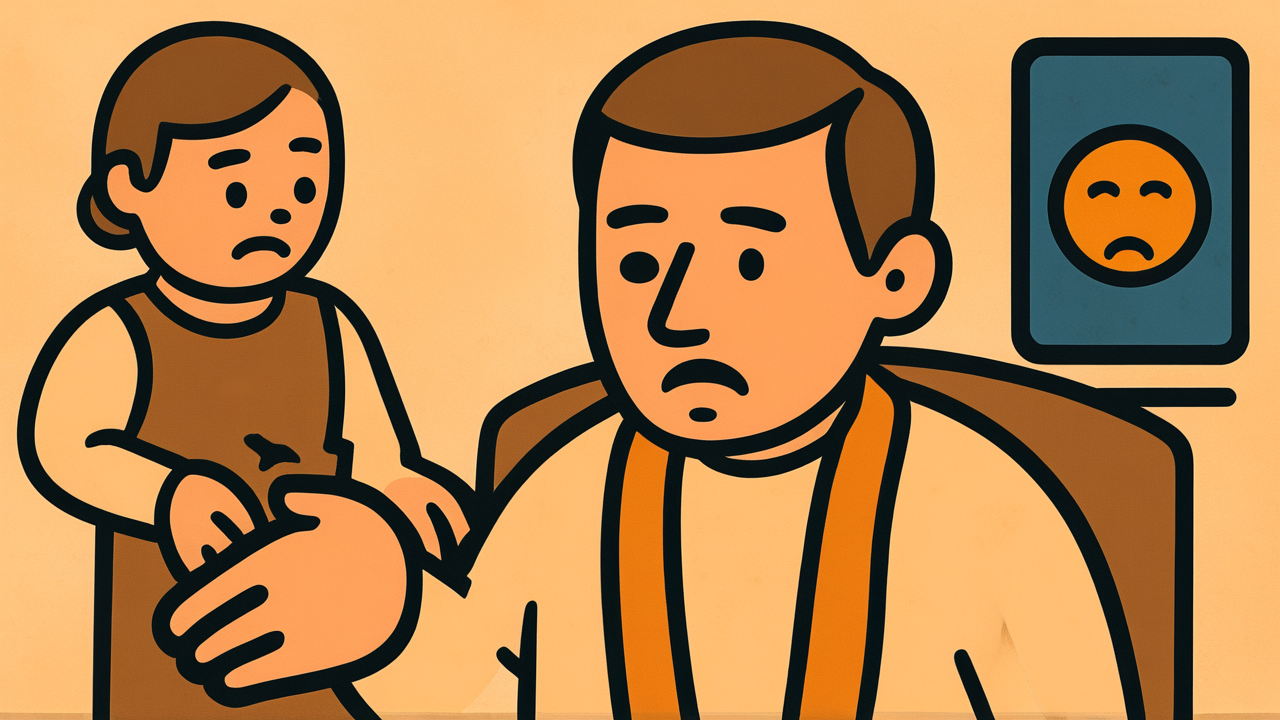How to Read “癩の瘡うらみ”
rai no kasa urami
Meaning of “癩の瘡うらみ”
“Leprosy’s sore resentment” is a proverb that describes how people who are already suffering from great misfortune or disaster also resent and lament even small misfortunes or inconveniences on top of that.
This expression originated from the situation where a person suffering from a serious illness would even resent minor skin troubles. It refers to the human psychological tendency that once struck by misfortune, one becomes concerned about even small things that would normally not bother them. It is used to describe situations where people who already have major problems complain or lament about even trivial matters. The reason for using this expression is to show that when humans are placed in difficult situations, their judgment becomes dulled and they tend to lose the ability to properly assess the relative importance of things. Even today, this can be understood as the psychological state where people under great stress become irritated by small things.
Origin and Etymology
To understand the origin of this proverb, we first need to know the meaning of the words “rai” and “kasa.” “Rai” is an old term referring to what is now known as Hansen’s disease, and “kasa” refers to swellings or wounds that appear on the skin.
According to the generally accepted theory, this proverb originated from medical texts and folk traditions of the Edo period. It is believed that people of that time began using this expression after observing situations where people suffering from the serious disease of leprosy would even resent minor sores (skin eruptions) in comparison.
Looking at the historical background, medicine was not yet well developed during the Edo period, and understanding of diseases was also limited. Skin diseases in particular appeared on the surface, so people’s interest was high, creating an environment where various folk beliefs and superstitions were likely to emerge.
The process by which this proverb became established reflects the fear of disease in society at that time and observations of human psychological characteristics. It came to be used among common people as an expression describing how someone bearing one great misfortune would also worry about even small misfortunes.
Usage Examples
- A major project failed, yet complaining even about the copy machine not working properly – that’s truly Leprosy’s sore resentment
- Getting angry about train delays on top of being laid off is what you’d call Leprosy’s sore resentment
Modern Interpretation
In modern society, this proverb has taken on new meanings. In our information society, we are constantly exposed to large amounts of information and it has become routine to simultaneously deal with various problems both large and small.
With the spread of social media, people can now easily express their dissatisfaction and complaints, and what we see there is precisely the phenomenon of “Leprosy’s sore resentment.” There are increasing numbers of people who, while discussing major social issues, simultaneously express dissatisfaction with the same intensity about trivial daily inconveniences.
In today’s stressful society, this condition is understood from a mental health perspective as “impaired judgment due to excessive stress.” The tendency for people with major worries to react oversensitively to small things is also considered one type of psychological defense mechanism.
Furthermore, with the development of consumer society, we live surrounded by far more services and products than before. As a result, when we have one major dissatisfaction, we tend to become concerned about other small dissatisfactions in a chain reaction.
While this proverb remains a perfectly applicable expression today, our understanding of the psychological state behind it has deepened considerably compared to the past.
When AI Hears This
When people who face backlash on social media today lash out with “the critics are the real problem,” or when employees who receive workplace feedback end up resenting their supervisors, we’re witnessing the exact same deep-rooted psychological pattern that people in Japan’s Edo period warned against centuries ago.
According to psychology’s “cognitive dissonance theory,” when people feel a contradiction between their actions and values, they’ll distort reality itself to maintain mental equilibrium. Modern grudge culture is precisely this mechanism operating on a massive scale. Because the psychological cost of admitting fault is too high, people construct narratives where “the person pointing out the problem is wrong.”
What’s particularly striking is how the digital age has accelerated this phenomenon. Anonymity and viral spread mean that grudges that would have stayed personal in the past now easily escalate into collective attacks. The surge in cases where companies or individuals criticized through hashtag movements turn around and attack their critics as “complainers” or “outrage merchants” proves this point.
The human foolishness that Edo period people cautioned against with expressions like “the leper’s grudge” has now evolved into social problems we call “victim cosplay” and “reverse anger culture.” While technology has advanced, it reveals the ironic reality that humanity’s fundamental psychological weaknesses remain unchanged.
Lessons for Today
What this proverb teaches us today is the importance of not losing sight of priorities, especially when we’re in difficult situations. When facing major problems, our perspective tends to narrow, and we become concerned about even small things we normally wouldn’t notice.
But precisely because of such times, please step back and ask yourself, “What is truly important right now?” Energy is finite. To concentrate on solving major problems, we shouldn’t have the luxury of being preoccupied with small dissatisfactions.
In modern society, we are constantly exposed to many stimuli due to information overload. That’s why it’s important to consciously establish priorities and develop the habit of focusing on what’s truly important.
This proverb serves as a mirror for objectively viewing our mental movements. If we can realize, “Oh, maybe I’m worrying too much about small things right now,” that awareness alone can lighten our hearts. It’s okay not to be perfect. We can accept human-like emotional movements while learning to deal with them skillfully.



Comments